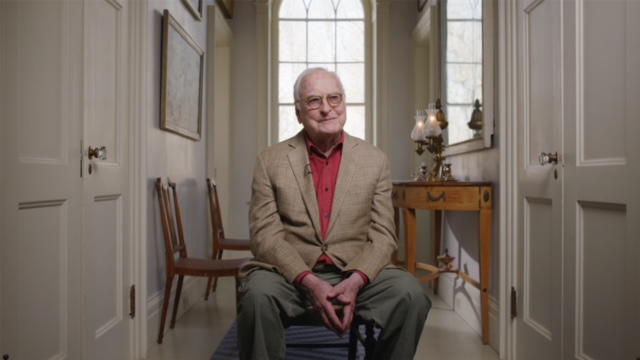
© Modenist | Film and Stephen Soucy Productions
The documentary directed by Stephen Soucy retraces one of the longest partnerships in the history of film. Merchant Ivory delves deep into the audacious company formed by Ismail Merchant as producer, James Ivory as director, Ruth Prawer Jhabvala as screenwriter and Richard Robbins as composer. Merchant Ivory productions ran from 1961 until 2007, creating 43 films: 42 produced by Merchant, 30 directed by Ivory, 23 written by Prawer Jhabvala and 21 scored by Robbins.
The interviewees who have worked with this extraordinary quartet of film craftsmen compose an exquisite mosaic of talking heads, capable of providing insight into the Merchant Ivory filmmaking approach. Amongst them are actors and actresses of the calibre of Academy Award-winning Dame Emma Thompson, DBE Helena Bonham Carter, Academy Award-winning, Vanessa Redgrave, Hugh Grant, James Wilby, Rupert Graves, Simon Callow, Sam Waterston, Natasha McElhone, Mark Tandy, Madeleine Potter, Greta Scacchi, Nickolas Grace, Felicity Kendal, Sam West, James Fox, and several others. There are also members of the crew who share their memories of this formidable team. They include, producer Paul Bradley, production assistant Richard Macrory and the Costume Designers who won an Academy Award for A Room With A View Jenny Beavan and John Bright.
The Merchant Ivory quartet is described as a group of “fascinating pirates chartering their world,” and the stories that emerge demonstrate how they managed to deliver ambitious films on very small budgets. Above all they were like a family that worked symbiotically. The headquarters varied from James Ivory’s house in Manhattan’s Midtown and his mansion Upstate in Claverack. The latter almost became a family unit where the four film creatives would gather and spend working days and leisure time together. James and Ismail almost had a Laurel and Hardy routine, whilst Ruth would stay in her room to write. Eventually they would all take a swim in the lake close by. This was their artistic hub where they would also host art exhibitions, parties and performances. Another unit was used to edit the films with the moviola and old equipment, with an assistant who lived there for the months required to finish the final cut. It was a very homey atmosphere.
Stephen Soucy brilliantly retraces the individual lives of each of the members of the quartet and how they intertwined on a personal and professional level. Jim (James Ivory) and Ismail were the complementary force of this artistic union. They met at the Indian Consulate in New York in 1961, when the American filmmaker showed his documentary called The Sword And The Flute released in 1959 and narrated by Saeed Jaffrey. This was Ivory’s first documentary he made at 32, whilst Ismail was 24 and had received an Oscar nomination as producer for the 1961 short The Creation Of Woman. The two connected watching films directed by Satyajit Ray like Teen Kanya (Three Girls).
 © Modenist | Film and Stephen Soucy Productions
© Modenist | Film and Stephen Soucy Productions
Being gay in the early Sixties was a discreet affair. This is a topic that is gently and sensitively explored in Soucy’s Merchant Ivory, and interweaves with the birth of the early films of the production company. In 1963 The Householder was a film made by Merchant Ivory Productions, with a screenplay by Ruth Prawer Jhabvala based upon her eponymous novel. Soon after the filmmaking trio made Shakespeare Wallah, about a travelling family theatre troupe of English actors in India, who perform Shakespeare plays in towns across. This very much mirrored how Merchant, Ivory and Prawer Jhabvala constituted a wandering company in their early days of production. Films came to life organically.
Very rapidly the team shot 15 films on location in their homes, between India and America. The Eighties epoch of film production began with Jane Austen in Manhattan, followed by the adaptation of Henry James’ novels The Europeans and The Bostonians. The great success came with E.M. Forster’s A Room with A View (the cornerstone of Helena Bonham Carter’s career) and Howards End. All these extraordinary period pieces were made with very contained budgets and were characterised by worldly sensibility, lush settings and complex characters. They managed to be subversive towards the aristocracy with the political subtext that permeated in their narratives, but the British audiences initially would snub them as “Laura Ashley Filmmaking.”
Merchant Ivory productions were ahead of their time in the way they chartered the way for the depiction on screen of LGBTQIA+ characters. It began with the film Maurice, that launched Hugh Grant’s career. People who had always been invisible were given encouragement. Ruth managed to improve the book through her adaptation, giving a motivation to Clive’s change of heart and James’ upbringing was very close to that Edwardian world so he easily portrayed the core of the story.
In terms of personality James Ivory and Ismail Merchant personified the concept of yin and yang, the former being calm and gentle, whilst the latter was defined as a firecracker. Ismail was prodigious in “shooting films on pennies” he had power of persuasion and would take on multiple tasks to cut costs. He was way more than a producer, he was the accountant, cook, lawyer and organiser of every film. He knew how to bargain and possessed a strong bazar mentality. Above all he was a charmer and had the ability to convince anyone to come onboard, he knew how to wheedle and cajole his interlocutors like a magician impresario. We get to know more of his origins through the film, as well as of James Ivory’s conservative upbringing in Oregon that somehow inspired Mr. & Mrs. Bridge, starring Paul Newman and Joanne Woodward.
James tells director Stephen Soucy he would longed, in his youth, to have a conversation with his father like the one at the end of Call Me By Your Name. His homosexuality was always lived with discretion not to upset his family, nor Ismail’s relatives. But the film crew knew and called them Jack & Jill.
James Ivory joked saying that their team was almost like the US government, with him being The President; Ismail, Congress; and Ruth, The Supreme Court. Soucy’s documentary provides insight in the quiet life of the woman who penned most of the screenplays of the production team. According to Ivory she had very much of a Fosterian quality, which explains how she brilliantly adapted such novels for cinema. Her profundity and grasp of literary nuances transformed into visuals the landscape trait described in Howards End allowing the iconic bluebells scene to come to life.
Ultimately we get acquainted with the composer of Merchant Ivory Productions, Richard Robbins. He came from a musical family in Massachusetts and became director of music in the Manhattan school attended by Ruth’s daughter, which is how he joined their creative team. Thanks to his music score, their films had a sense of internal turmoil that created fret but also a minimalist drive towards narrative tension. It enhanced one of Anthony Hopkins’ performance in The Remains Of The Day — one of the best of his career. An interviewee underlines how Bernard Herrmann was crucial for Alfred Hitchcock’s films, just as Nino Rota for Federico Fellini, and equally Richard Robbins for the Merchant Ivory pictures. But matters got complicated when an affair blossomed between Robbins and Merchant, that eventually ended with the composer settling with his long-term partner, artist Michael Schell.
Despite James and Ismail could have a very volatile relationship their artistic bond was indissoluble. The invincible quartet gradually fell apart, with the deaths of Ismail (2005), Robbins (2012) and Prawer Jhabvala (2013). James was devastated and traversed a long widowhood after the death of Ismail and the only project he directed was The City Of Your Final Destination. However at the age of 89, James Ivory won an Academy Award for for Best Adapted Screenplay with Call Me By Your Name. His acceptance speech was dedicated to his lifelong film companions.
Today, Stephen Soucy has completed the first definitive feature documentary about the extraordinary quests of the pillars of the Merchant Ivory Productions. As the director rightly defined them, they “became the most famous collaborative troika in film history,” and this motion picture serves as a precious testament to their transformational cinematic creativity.
Final Grade: A-

